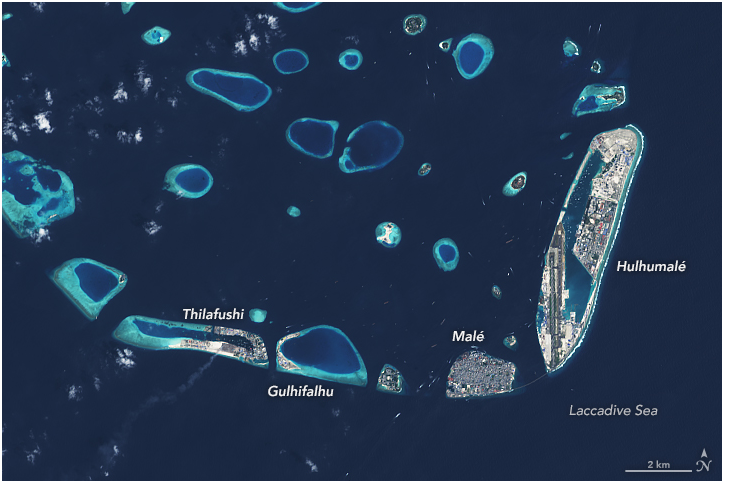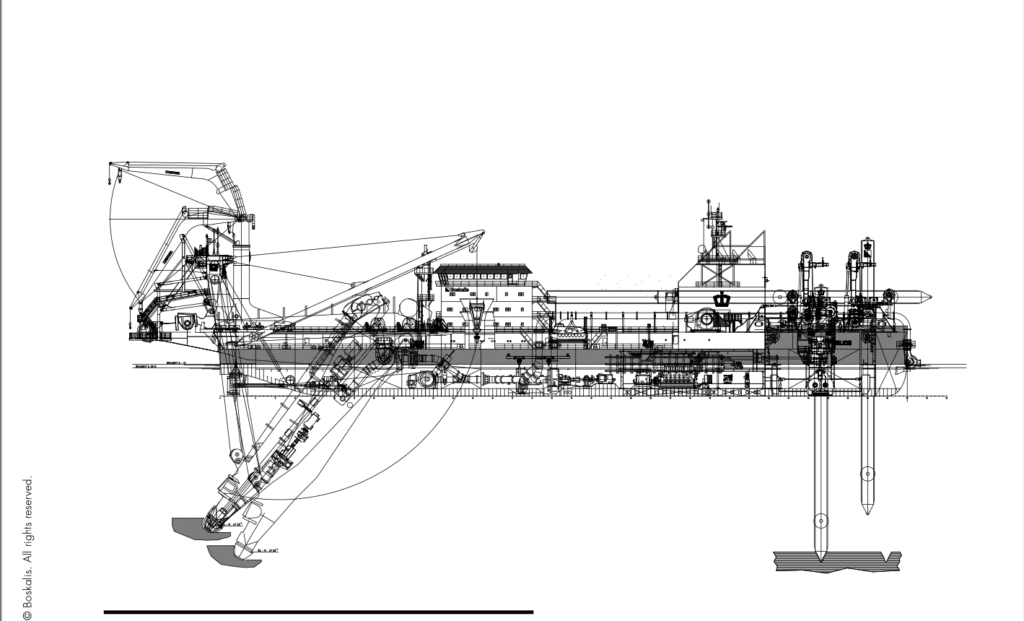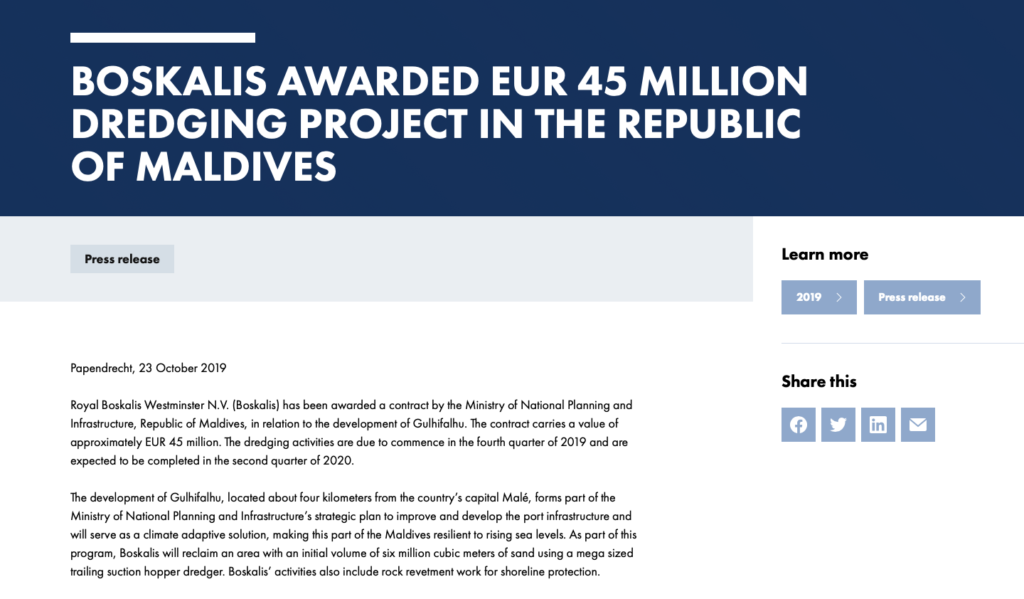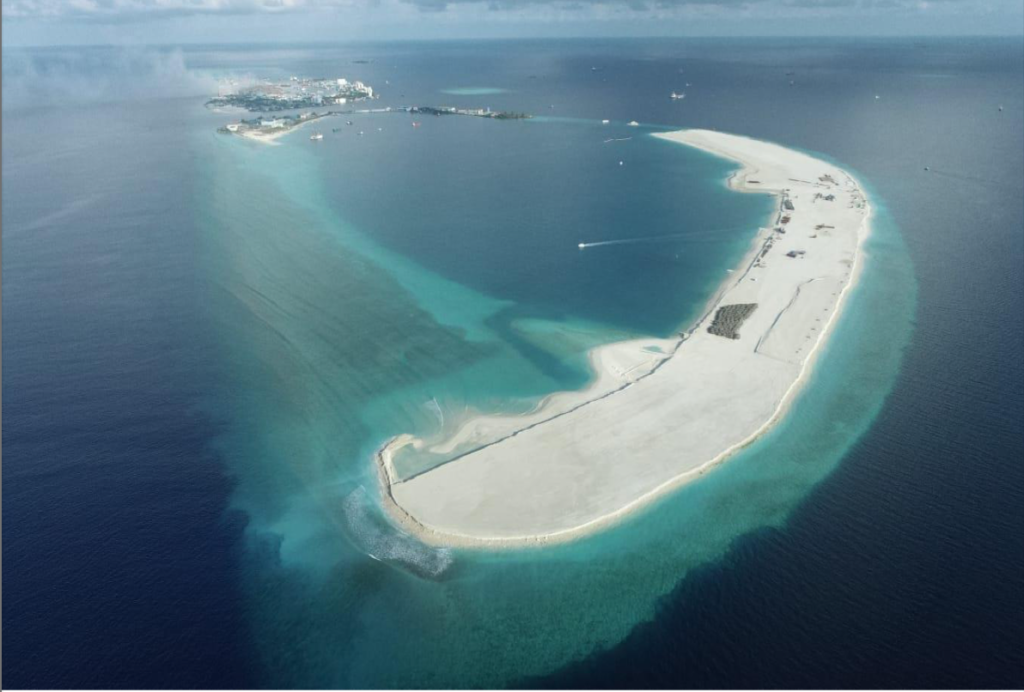Open letter to the people of The Netherlands, from the environmentally endangered Maldives

This letter, penned by Humay Abdulghafoor, volunteer for the Save Maldives campaign, addresses the people of The Netherlands with a story little-told: how their nation’s business enterprise has produced another’s destruction and demise, through dredging, reclamation, and port development.
This letter, penned by Humay Abdulghafoor, volunteer for the Save Maldives campaign, addresses the people of The Netherlands with a story little-told: how their nation’s business enterprise has produced another’s destruction and demise, through dredging, reclamation, and port development.
January, 2023
Dear Netherlands,
New Year’s greetings from the Maldives. You may have heard about our country: an earthly “paradise” that is home to luxury tourism. That’s the marketed image, representing a “sunny side of life”. We also have several, less sunny stories. This particular one is about the endangered and finite ecosystems of the Maldives that have an unhappy connection to your country, the Netherlands.
You and us – we are all in the same predicament, even if we are not in the same hemisphere. We are all experiencing a great earth-heating climate crisis that is breaking down global climate systems. Scientists tell us that we humans are causing this Earth crisis. The United Nations tells us the situation is “code red for humanity.” Our actions and inaction have been creating an existential and extinction crisis.
Of course, the Dutch people would be very familiar with what this means.
You will no doubt remember the landmark decision of the Dutch Supreme Court on 20 December 2019, the Urgenda Climate Case, which decided that the Dutch government had obligations to “urgently and significantly reduce emissions in line with its human rights obligations”. All governments have these obligations, although most choose to do little or nothing. The Netherlands is very lucky to have a judicial system where redress is available in court for serious grievances raised by concerned people, against unlawful and irresponsible decisions of the government, in our time of catastrophic climate crisis.
The Urgenda decision seeks to protect not just yourselves, but all of us inhabiting the Earth.
While we in the Maldives may be thousands of miles away, this decision in the Dutch courts is a big deal.
The whole world knows today that politicians around the world have consistently failed to address the climate crisis with decades of failed and farcical international conferences. This is why the Dutch Supreme Court’s decision in Urgenda stands out.
As you know, global climate breakdown is an existential crisis for many of us living in coastal nations, especially low lying small islands like the Maldives. Most of our 1,200 or so islands are less than one metre above sea-level. Our islands are made of coral and sand. Every island is an organic, living entity, protected by a living reef-defence-system, sometimes with the additional security of seagrass meadows and mangrove ecosystems which, when healthy, are teeming with marine life and biodiversity. We are just beginning to understand the richness of this biodiversity, which remains poorly studied.

But our life-giving ocean, marine life, and biodiversity which collectively make up our critical natural reef defence systems have been under increasing threats due to many factors involving destructive and unsustainable development practices. Many of our reefs and lagoons have been completely and irreversibly destroyed. You may wonder who or what is destroying the reefs of the Maldives? The simple answer is that, primarily, it is the government and political decision-makers of the Maldives. But the government has been able to do this with the help of global dredging corporations and banks, although today, Maldives also has its own state-owned company, MTCC Plc also doing enormous damage.
The leading giants of the trade are two notable companies, Royal Boskalis and Van Oord, from the Netherlands. They are the expensive and profitable tools deployed to destroy our living environment, irreversibly and permanently. This story is mainly about the activities of Boskalis.

Royal Boskalis has over a decade-long history of reclamation that has destroyed community reefs and livelihood assets in several islands of the Maldives. Some of these activities are labeled as ‘climate adaptation projects’. The cost of that destruction is enormous, running into millions of US dollars of public debt, often loaned from the ING Bank of Netherlands. In 2010, Royal Boskalis and MT- Hojgaard of Netherlands engaged in reclaiming five islands in the Maldives at an estimated US$43 million, borrowed from the ING Bank of Netherlands. These are the kinds of funds that are not available locally to develop community-based initiatives that improve people’s lives. You may be surprised to learn that this reclaimed land from over a decade ago remains unused and unavailable to local people.
This is, of course, a problem of the Maldives government. The point is that the big reclamation contracts to big companies, paid with large amounts of public debt, continue with relative ease, while no funds are available to do anything with the reclaimed land. Reclamation destroys sustainable livelihood resources and undermines the basic security functions of the living island reef systems irreversibly. Once an ancient reef is lost, it cannot be brought back. The partial or complete destruction of the natural reef defenses exposes islands to erosion and climate change disasters.
More recently in 2019, Royal Boskalis was contracted to undertake the largest and deepest reclamation project thus far in the Maldives: the Gulhifalhu Port Development project, which is estimated to cost Maldivian taxpayers US$120 million just for the reclamation. Notably, the project was contracted to Boskalis before an environmental impact assessment (EIA) was produced to understand its impacts. It was also contracted without a bid, which media reported was being probed by the Maldives Anti-Corruption Commission. Whether anyone has been held to account about such irregularities is not known in the murky governance environment of the Maldives.

The Gulhifalhu project will dredge an area of 13.75 sq/km in northern Malé Atoll, extracting 24.5 million cubic metres of naturally formed biogenic sand from the ocean to reclaim the Gulhifalhu lagoon. The environmental and eco-systemic loss and damage of this project was poorly evaluated, and the loss and damage have not been properly costed environmentally or financially. This may be because the project’s initial EIA noted that the project was a foregone conclusion even before the EIA was commissioned. It is also a sad fact that the EIA processes in the Maldives are deeply flawed and do not serve the public interest.
What is also a foregone conclusion is that the project will destroy a marine protected area (MPA) in Gulhifalhu lagoon, called the Hans Haas Place and designated in 1995. It is also accepted that the project will negatively impact approximately 30 dive sites in the area, having significantly damaging impacts on reef ecosystems, including the reefs of several resorts in the area. The project is expected to destroy the last remaining natural reef freely accessible to local people in the area, located in Villimale island a few hundred metres from the Gulhifalhu lagoon. It will also negatively impact small businesses and fisherfolk.
In June 2020, when Boskalis first began dredging the lagoon, a significant sediment plume damaged the Villimale reef. However, concerns expressed by local people and civil society stakeholders about the project, which was submitted for parliamentary scrutiny, was largely ignored by the Maldives government and the parliament. Instead of protecting Gulhifalhu and its threatened surrounding marine ecosystems, the parliament’s Environment and Climate Change Committee instead chose to justify the project.
A few months prior to this, the Maldives parliament had passed a motion to declare a Climate Emergency in the Maldives. At the same time, the Maldives suffers deeply from political instability, poor governance, policy poverty, endemic corruption and even poorer environmental protections of its own finite natural resources and assets. This may be a surprise to anyone reading about the Maldives’ leading role at climate conferences and global victim-status from impending climate catastrophe. The story on the ground is far removed from that politically manufactured image of the ‘sinking Maldives’ with ‘no higher ground’ to climb. That political rhetoric is disseminated around the world by the international media, on behalf of well-connected politicians who receive copious amounts of column inches and broadcast coverage.
In June 2020, during the Covid-19 pandemic while the country was in lockdown, Boskalis arrived on site and engaged in a greenwash initiative to “relocate corals” from the Gulhifalhu reef. The company said this was conducted as a CSR (corporate social responsibility) activity!
Is it really so noble of a global corporation taking on a multi-million dollar project financed with foreign loans that must be covered by public debt to offer CSR to that same foreign state? It is evident that this is part of the company’s marketing strategy of presenting an image of ‘eco-friendly’ credentials.
The notion suggesting that a reef can be ‘relocated’ is unintelligible, with no scientific credibility as any Maldivian or visitor to the Maldives who has seen our natural reefs would know. This idea is absolutely untenable, has no substance and is nothing but a corporate smokescreen. Coral gardening, involving the removal of coral fragments to grow elsewhere, is an experimental tourist attraction in some resorts in the Maldives, which is also a type of corporate greenwashing. However, the project’s official website considers “coral relocation” a triumph of the project!

Due to the enormity of the destruction planned by the Gulhifalhu reclamation project, civil litigation action to stop it was lodged at the Civil Court of Maldives in September 2021, which remains pending to date. Sadly, the Maldives courts do not have a good history of protecting the country’s fragile environment or holding the government accountable for environmental crimes. This is so even if some of our laws on environmental protection are reasonably progressive. Unlike the Netherlands, the courts in the Maldives are yet to be tested to address environmental destruction and our common climate crisis. This is the case despite the country’s extreme vulnerability and position at the forefront of global climate breakdown. This is in spite of the Maldives’ political pleas to the world at international fora to act on the climate, through its projected image internationally as a ‘climate champion’.
A significant amount of inconsistent, opposing and opportunistic narratives are created by Maldivian politicians with short-term goals who willfully risk the health and life of entire ecosystems, people’s lives and sources of livelihood. But they cannot do this without the active support of global corporations like Boskalis and the ING Bank of Netherlands. As the European Union strengthens its laws and law enforcement to do due diligence on climate change related matters, European corporations are finding poorly governed nations like the Maldives to exploit.
In June 2022, undeterred by its people’s concerns, the government of Maldives took out a loan of €101 million from three European banks, including the ING Bank of Netherlands, to continue with the second phase of the Gulhifalhu reclamation project. Boskalis is expected to be back in the Maldives in 2023 to inflict extreme damage to the north Malé region with the next and most destructive phase of the reclamation project. Since its initial estimate of 20 million cubic metres of sand use, the project has increased this to 24.5 million cubic metres using an addendum to the EIA in November 2021. What the project will eventually extract is anyone’s guess.

This is a situation where information is withheld from the public and Boskalis’ sand-search survey for the Gulhifalhu project is considered a ‘trade secret’, even from the Maldives parliament! We do not know the scope of damage this project will cause to the region when a massive dredging vessel deploys its destructive forces into a marine environment rich with life from the seabed to the surface. The after-effects of a string of expensive, historical reclamation projects under Royal Boskalis’ belt in the Maldives have never been studied. There are no funds to study the loss and damage. There is never enough funds to obtain accurate baseline data for these projects either. The funds are instead available from corporate banks for corporations like Boskalis to inflict permanent irreversible and unstudied damage at great financial and debt costs to the people of Maldives.
These are highly lucrative multi-million dollar projects, taking just a few short months for the contractor to impose untold ecological harm. The direct and collateral damage inflicted by Boskalis will be suffered by present and future generations of Maldivians. This will happen after the vessel has made its money and safely left our shores, leaving us to deal with the debt, destruction and damage as the climate crisis unfolds before us.
As the new year breaks in 2023, the news breaking in the Maldives is that two of the most damaging marine contractors from the Netherlands will be actively destroying critical marine ecosystems with unknown losses and damage to communities and people in the Maldives. Van Oord is planning to dredge Addu Atoll Biosphere Reserve, endangering multiple MPAs, marine habitats of mega-fauna such as manta rays and undermining the climate resilience of the entire atoll. Royal Boskalis will be preparing to destroy Gulhifalhu reef and lagoon.
These are the untold stories of Maldives on the frontline of the global climate crisis. As we become increasingly conscious of our interconnectedness on earth, it is necessary to tell the story of how one nation’s business enterprise has become another’s destruction and demise.
If you have come this far, thank you for reading. And thank you for Urgenda.
That decision carries with it a spark of hope for many.
Sincerely,
The Maldives, Indian Ocean
#savemaldives is a citizen-led environmental campaign by concerned individuals from diverse backgrounds who are extremely worried about irreversible environmental destruction in the Maldives.
This open letter was first published on Contested Ports. Re-posted here with author’s permission.
